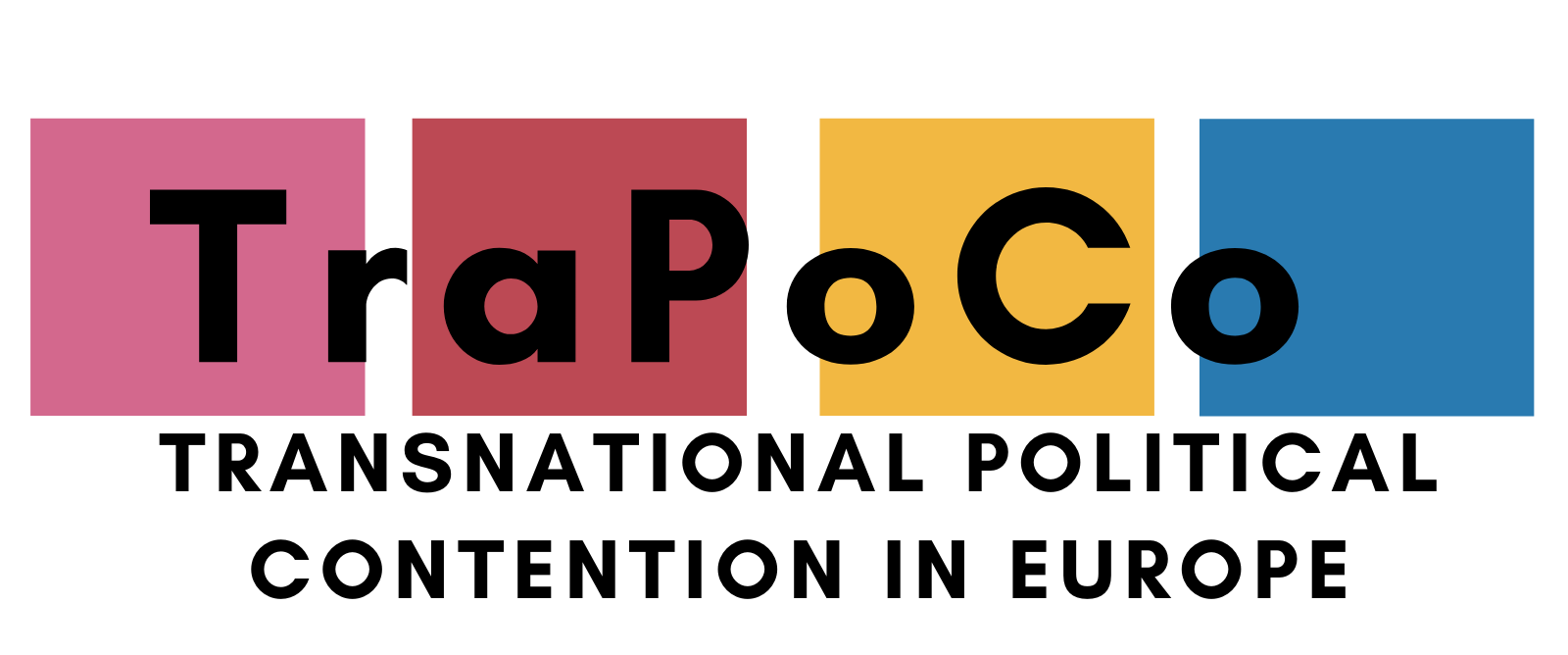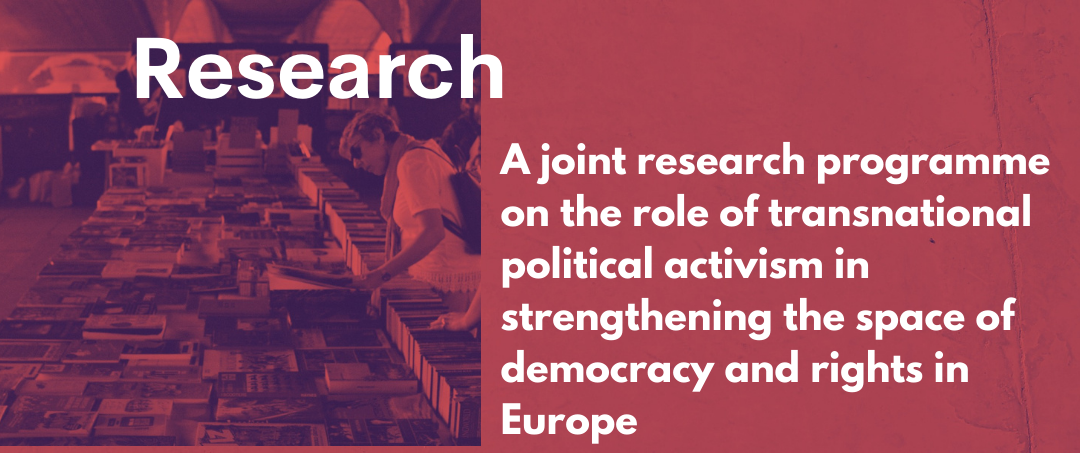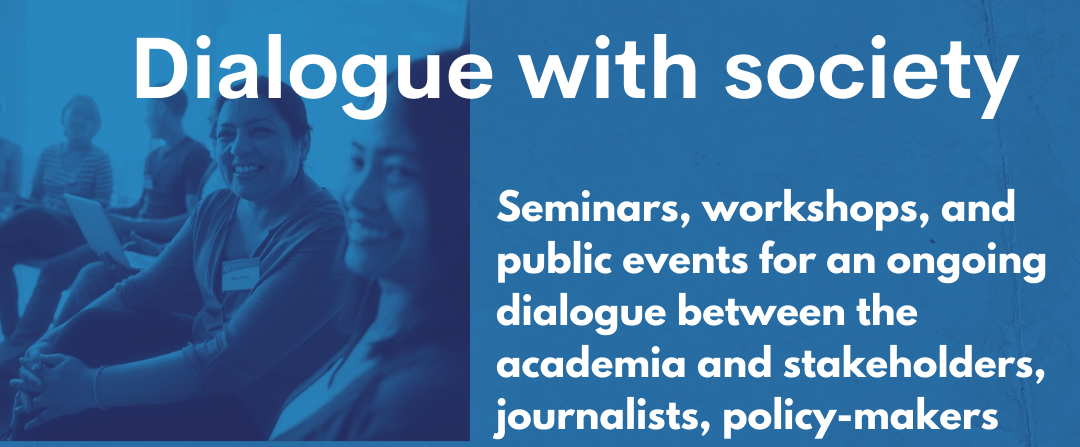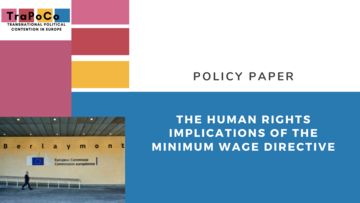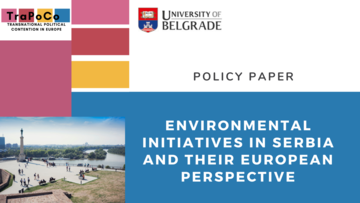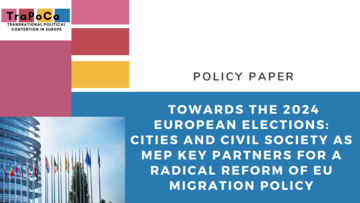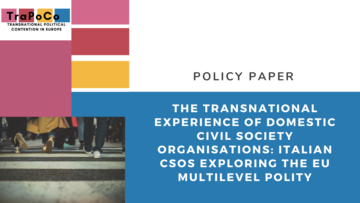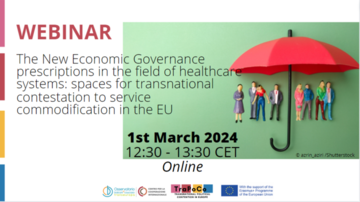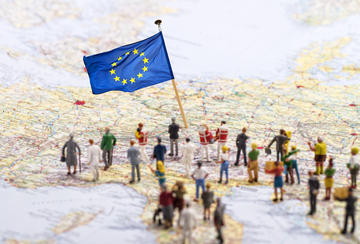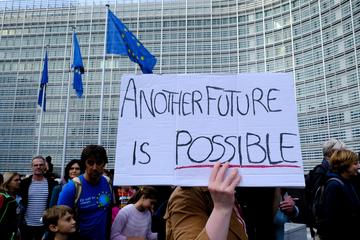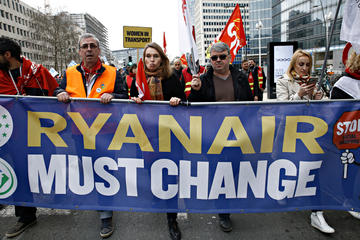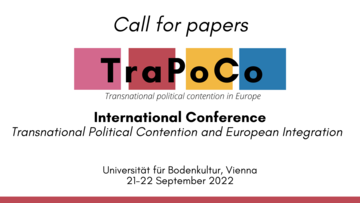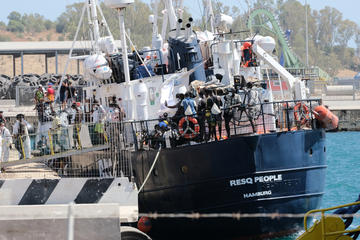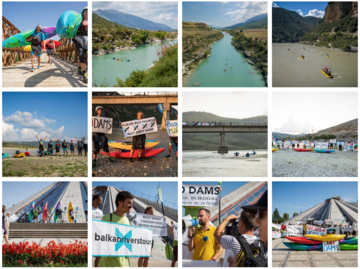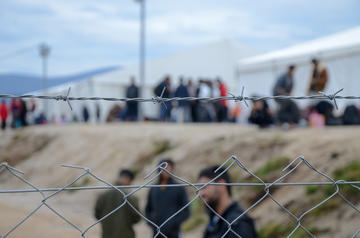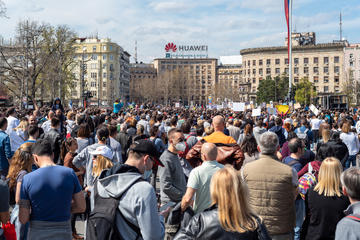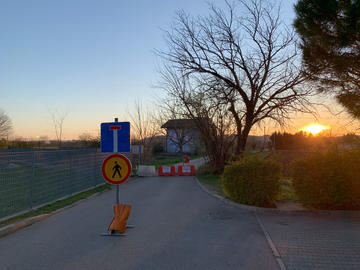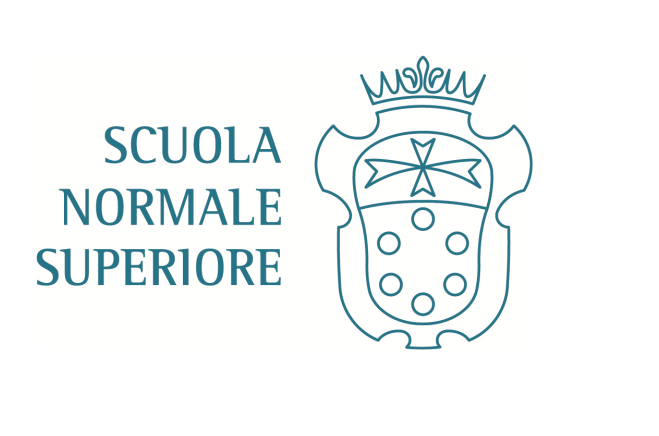Luisa Chiodi, Fazila Mat and Oliver Schmidtke, 'Seizing Transnational Opportunities in Times of Populism: The Transformation of Civil Society', in Chiara Milan, Aron Buzogany, (forthcoming), "Transnational political contention in the European union and beyond", Palgrave Macmillan
Abstract:
Italy’s civil society organisations (CSOs) are a captivating case for studying the transformation of CSOs’ political activism in the face of the European Union’s (EU) complex multilevel polity, gradually favoring CSOs’ transnational mobilization. As its main contribution to the evolving political opportunities for civil society actors in Italy, this chapter sheds light on the opportunities and limitations offered by the European space in pursuing CSOs’ political ambitions in a political context in which the relationship with political parties has profoundly changed, and the populist wave has made Italy’s political landscape more adverse to civil society advocacy. We also take into account that in the same period of time, the EU political and legal space has seen a notable consolidation and opened a political and institutional space for the trajectory for and the achievements of the mobilisation of Italian CSOs. We explore the challenges and opportunities that CSOs face in contemporary Italian society drawing on 28 in-depth interviews with representatives of selected NGOs, activists and lawyers mainly engaged in the field of migrants’ and LGBT’s rights. In addition, we use documentary evidence from campaigns in the form of press releases, reports, media coverage, judicial decisions and academic sources. Empirically, we investigate a few cases of transnational civic initiatives that exploit the EU multi-level system and that include legal actions, legislative proposals, and monitoring work. With a view to their - controversial - status, the activism of these CSOs reflects the transformation of Italy’s politics and the constraints under which civil society groups operate, but also the opening of opportunities at the transnational level.
Fazila Mat, Luisa Chiodi, Oliver Schmidtke, "Europeanization as Pragmatic Politics: Italy's Civil Society Actors Operating in the Face of Right-wing Populism", Social Sciences (Basel)
Abstract:
This article examines how and under what conditions Italy’s civil society organizations (CSOs) have resorted to transnational activism and to what extent these efforts translate into impactful political advocacy. The analysis focuses on the action strategies of these civil society actors that have come under considerable pressure through the resurgence of populist-nationalist actors in the domestic arena. Developing an actor-centred perspective from below, this article draws on a series of 27 interviews conducted with these organizations’ representatives working primarily on issues related to migration and refugees in Italy. The empirical study examines some key initiatives that see domestic CSOs as protagonists in the transnational realm and explicates their motivations, approaches, and experiences. Conceptually, the article distinguishes between the vertical and horizontal Europeanization of CSOs. While there are notable opportunities for CSOs to engage in Brussels-centred governance and policy making, the effectiveness of horizontal Europeanization in the form of cross-border networking is - at first sight paradoxically - limited by the EU’s system of multi-level governance. The central argument about Europeanizing civil society activism is that these processes are primarily driven by a pragmatic pursuit of solutions to concrete problems that could not be properly addressed in an increasingly hostile domestic environment.
Access the article: https://www.mdpi.com/2076-0760/13/4/205
Chiara Milan and Chiara Martini, 'Bringing care in. The meaning of care in refugee solidarity movements', forthcoming, Journal of Refugee Studies
Abstract:
This article investigates the meaning that refugee solidarity activists supporting people on the move across the Western Balkans migratory route and at the Italian-French border attribute to the notion of “care”, which they use to define their solidarity practices, particularly in the aftermath of the global pandemic. By means of a content analysis of in-depth interviews with representatives of grassroots solidarity groups, the article demonstrates that “care” is conceived of as having a political character, as it responds to both the crisis of health care and to the restrictions on freedom of movement; a non-hierarchical connotation, which informs in- and out-group relationships, and a transformative orientation, as acts of care prefigure a society in which freedom of movement and health rights are granted to all, in contrast to the existing model of migration governance.
Darragh Golden & Roland Erne (2022), Ryanai pilots: Unlikely pioneers of transnational collective action. European Journal of Industrial Relations, 28(4), 451-469
Abstract:
In aviation, EU single market rules empowered Ryanair over three decades to defeat all pilot unions across Europe, regardless of the notionally strong power resources on which they were relying in their countries. Nonetheless, in December 2017, a transnational group of union-related pilots, the European Employee Representative Committee was critical in forcing Ryanair to finally recognize trade unions. This study shows that multinationals’ ability to circumvent national union power resources does not necessarily undermine transnational collective action. Hence, transnational union strength does not primarily depend on an aggregation of national power resources, but on union activists’ ability to exploit union-friendly peculiarities that the EU governance regime is also providing. We show that the apparently weaker institutional power resources at EU level provides more effective leverage for transnational collective action than apparently stronger power resources embedded within French, Danish, or Norwegian labour law. This requires an understanding of scale.
Access the article:
https://journals.sagepub.com/doi/full/10.1177/09596801221094740
Mina Petrović & Jelena Pešić (2023), Potentials and Obstacles for the Transnationalization of Recent Environmental Struggles in Serbia. Sociologija i prostor, 61 (2023) 227 (2): 397-422
Abstract:
Considering the growing tendency of contemporary environmental movements from the Global North to internationalise their struggles, in this paper we try to explore the potentials and obstacles of recent environmental initiatives in Serbia - the protests against small hydropower plants and struggles against the exploitation of lithium - to scale-up from the local to national and transnational level. Focusing on the discursive framing of these initiatives based on the analysis of the digital content created and shared by environmental organisations and activists on social media, we investigate to what extent eco-nationalism represents an incentive or a barrier for the creation of transnational alliances. We also explore the willingness of this movement’s advocates to participate in organised collective actions addressing their grievances to international institutions, and especially to the European Union. We interpret the emergence of eco-nationalism as related to the environmentalism of the poor/dispossessed, which arises as a reaction to the commodification of natural resources, advancing neoliberal policies and neoextractivism on the (semi-)periphery of the world capitalist system.
Access the article:
https://hrcak.srce.hr/file/446003
Federico Alagna & Eugenio Cusumano (2022), Varieties of criminalization: Italy’s evolving approach to policing sea rescue NGOs. Contemporary Italian Politics
Abstract:
The appointment of a new right wing cabinet in Italy has caused non-governmental search and rescue organizations once again to be condemned as a supposed pull factor encouraging undocumented migration, and to be subjected to new restrictions on their activities. The attempt to restrict non-governmental sea rescue is, however, far from new. This article describes the evolution of this criminalization process by comparing the policies enacted under four different Italian Interior ministers: Marco Minniti, Matteo Salvini, Luciana Lamorgese and Matteo Piantedosi. We argue that, although important analogies can be found in Salvini’s and Piantedosi’s political discourses, the latest Interior minister has departed from Salvini’s confrontational but ultimately unsuccessful ‘closed ports’ policy by strategically developing some of the subtler tactics adopted by Minniti and Lamorgese. These include, for instance, the imposition of burdensome requirements on organizations rescuing and disembarking migrants and the use of administrative rather than criminal legal instruments to impound ships. As they are less likely to face judicial review and/or cause political backlash than direct criminalization, these indirect hindrances provide more viable avenues for restricting NGOs, but also threaten dire humanitarian consequences, exacerbating the gap in rescue capabilities off the Libyan coast.
Access the article:
https://www.tandfonline.com/doi/abs/10.1080/23248823.2023.2220186?journalCode=rita20
Federico Alagna (2022), Civil Society and Municipal Activism Around Migration in the EU: A Multi-Scalar Alliance-Making. Geopolitics.
Abstract:
Civil society and municipal actors – and the interaction between one another – have become increasingly relevant in EU migration governance. Moving from this understanding, this article explores instances of migration activism in connection with the proactive and contentious role of cities. It does so through the in-depth analysis of the dual EU-wide network From the Sea to the City/International Alliance of Safe Harbours, which gathers numerous civil society initiatives and municipalities and aims to achieve a radical change in EU migration policies. Based on extensive empirical research, my contribution illustrates why the emergence of a multi-scalar alliance between civil society and municipal actors around migration is the result of the interaction between the political agency of these actors and the changing institutional opportunities and constraints at different governance levels. In doing so, it explores different spatial and political dimensions, from cities to transnational arenas, reflecting on their significance in the construction of an EU-wide contentious politics of migration.
Access the article:
https://www.tandfonline.com/doi/full/10.1080/14650045.2023.2230902
Chiara Milan (2023), Emotions in Action: The Role of Emotions in Refugee Solidarity Activism. Sociological Forum. Volume38, Issue3. September 2023
Abstract: This article investigates the different types of emotions that result from participation in refugee solidarity activism, investigating how they change over time and to what extent they explain why individuals remain involved in action in spite of unfavorable circumstances. By bringing together scholarship on collective action with the literature on emotions, the article delves into the emotional response of sustained engagement in refugee solidarity activism. The study is based on the analysis of 40 in-depth interviews with solidarity activists and volunteers involved in grassroots refugee solidarity initiatives along the Western Balkans route between 2015 and 2021, as well as on participant observation conducted between 2016 and 2021 in North Macedonia, Serbia, Croatia, Slovenia, Austria, and Bosnia and Herzegovina. The diachronic perspective presented in the article suggests that contrasting reactive emotions emerged during the initial stage of mobilization, while moral emotions were activated at a later stage. In the long run enduring affective bonds that had been formed with both solidarity peers and people on the move proved decisive for keeping individuals involved in action.
Access the article: https://doi.org/10.1111/socf.12926
Adam Fagan & Aron Buzogány (2022) Beyond Europeanization: political ecology and environmentalism in Central and Eastern Europe, Environmental Politics, 31:7, 1203-1213
Abstract: The legacy of Europeanization was a battery of laws, formal mechanisms for compliance and regulation, and institutionalised access for non-state actors. Despite a decade of so-called ‘democratic backsliding’, EU environmental standards and policy remain as normative benchmarks for all countries across the region. The new member states are no clear outliers in terms of compliance even if they have a tendency to support less green climate and energy legislation at the EU level. Yet civil society autonomy and freedom to operate have been severely constrained in most of the states of the region, resulting in ‘shrinking spaces’ for civil society actors that are critical of de-democratizing tendencies. The EU has been sharply criticised for failing to protect the liberal democratic order in the region. Indeed, if the EU conjures a reaction within protests and actions of civil society and social movements, it is mostly with negative connotations, such as failure to hold domestic elites to account or encouraging mega-developments. All of this suggests that, over 30 years since environmental activism first came to political prominence in the region, there is a need to re-engage with a host of domestic factors that had become somewhat obfuscated by the emphasis on Europeanization.
Access the article: 10.1080/09644016.2022.2147652
Aron Buzogány (2022): Natural Allies? External Governance and Environmental Civil Society Organizations in the EU’s Eastern Partnership. Problems of Post-Communism, 69:4-5, 369-379
Abstract: Civil society networks have received little attention when it comes to sectoral analysis of adaptation of EU rules beyond borders. This article offers a remedy by conceptualizing EU influence as an opportunity structure, a resource, and a discursive frame used by civil society organizations. Empirically, it describes how EU rules are used to support environmental reforms by civil society networks in Georgia and Ukraine. Civil society activism and mobilization can lead to high levels of policy approximation despite weak sectoral conditionality, entrenched domestic interests, and low public salience.
Access the article: https://doi.org/10.1080/10758216.2021.2025404
Aron Buzogány, Patrick Scherhaufer (2022): Framing different energy futures? Comparing Fridays for Future and Extinction Rebellion in Germany. Futures. Volume 137, March 2022
Abstract:
Combining research on sociotechnical imaginaries and social movements, this contribution examines how two major actors of the climate justice movement active in Germany – Fridays for Future and Extinction Rebellion – frame the discourse on climate change and just transitions. We focus on narratives of both movements and their justification strategies based on the analysis of frames. Using material produced by the two movements, the paper comparatively analyses the movement’s frames on social, political, economic and epistemic orders. The results suggest that the two groups are part of the same discursive community but emphasize different aspects of just energy futures.
Access the article: https://doi.org/10.1016/j.futures.2022.102904
Aron Buzogány, Szabina Kerényi & Gergely Olt (2022): Back to the grassroots? The shrinking space of environmental activism in illiberal Hungary. Environmental Politics, 31:7, 1267-1288
Abstract: This article illustrates the post-euphoric development of the environmental movement in the period since 2010 that was marked by democratic backsliding and the consolidation of ‘illiberalism’ in Hungary. Embedded from a historical perspective that spans the last three decades, we present two case studies of urban environmental mobilisation and identify ‘localization’, the reorientation towards grassroot activism, as a new trend driven by the closure of political opportunity structures. Localization combines with the alienation of protesters from institutional channels of influence-seeking and the weakening of ties with potential political allies, such as political parties or professionalised NGOs, and the increase of mistrust between the different actors
Access the article: https://doi.org/10.1080/09644016.2022.2113607
Chiara Milan & Luisa Chiodi, (2022), Grassroots European Solidarity. Italian Solidarity Movements in the Western Balkans in the 1990s and 2020s and Their Visions of Europe, Southeastern Europe n.46 pp. 248–270
Abstract:
This article investigates how the idea of European solidarity and the vision of Europe changed over time amongst Italian groups and individuals engaged in solidarity actions in support of Internally Displaced Persons (idp s) and refugees in the Western Balkans in the 1990s and 2020s. By means of document analysis and in-depth qualitative interviews, the article shows that individuals partaking in solidarity initiatives framed their action as European grassroots solidarity, enacted to replace the institutional solidarity that the EU failed to offer. While solidarity groups in the 1990s saw the EU-in-the-making as alternative to the power politics of member states worsening the conflicts in the region, those mobilising in the 2020s expressed a more critical and disenchanted vision characterised by rage, disillusionment, and disappointment towards an EU perceived as having betrayed its ideal foundations while dealing with migration along the Balkan route.
Access the article:
Pešić J., Vukelić J. (2022), 'Europeanisation from below at the semi-periphery: the movement against small hydropower in Serbia'. Sociologija 2022 Volume 64, Issue 1, Pages: 5-27
Abstract: This paper focuses on Let’s Defend the Rivers of Stara Planina, a local environmental initiative that has managed to scale up and transnationalise (Europeanise) from below and to generate sufficient pressure on national power-holders to amend existing legislation and halt further construction of small hydropower plants in protected natural areas. Linking the concepts of environmentalism of the poor/dispossessed and the transnationalisation (Europeanisation) of environmental protests through the example of Serbian protests against small hydropower plants, we explore how a local movement grew out of a tradition of non-politicised everyday environmentalism, transformed into a rebellion of the dispossessed and then tried to organise at both national and transnational level, using assistance from EU institutions and international environmental organisations to leverage national authorities and developers, while at the same time remaining critical of certain EU environmental policies and practices. This study is based on discursive analysis of the content posted to the official Facebook group and website of Let’s Defend the Rivers of Stara Planina.
Access the article: http://www.sociologija.org/admin/published/2022_64/1/752.pdf
Szabó, I. G., Golden, D. and Erne, R. (2021) 'Why Do some Labour Alliances Succeed in Politicizing Europe Across Borders? A Comparison of the Right2Water and Fair Transport European Citizens' Initiatives'. Journal of Common Market Studies, 60(3): 634-652.
Abstract:
Under what conditions can organized labour successfully politicize the European integration process across borders? To answer this question, we compare the European Citizens' Initiatives (ECIs) of two European trade union federations: EPSU's successful Right2Water ECI and ETF's unsuccessful Fair Transport ECI. Our comparison reveals that actor-centred factors matter – namely, unions' ability to create broad coalitions. Successful transnational labour campaigns, however, also depend on structural conditions, namely, the prevailing mode of EU integration pressures faced by unions at a given time. Whereas the Right2Water ECI pre-emptively countered commodification attempts by the European Commission in water services, the Fair Transport ECI attempted to ensure fair working conditions after most of the transport sector had been liberalized. Vertical EU integration attempts that commodify public services are thus more likely to generate successful transnational counter-movements than the horizontal integration pressures on wages and working conditions that followed earlier successful EU liberalization drives.
Access the article: https://onlinelibrary.wiley.com/doi/epdf/10.1111/jcms.13279
POLICY PAPER
The Human Rights Implications of the Minimum Wage Directive, by Graham Finlay e Roland Erne, University College Dublin (June 2023)
Environmental initiatives in Serbia and their European perspective, by Jelena Pešić and Jelisaveta Vukelić, University of Belgrade – Faculty of Philosophy (March 2023)
Towards the 2024 European elections: Cities and civil society as MEP key partners for a radical reform of EU migration policy, by Federico Alagna, Scuola Normale Superiore (September 2023)
The transnational experience of domestic civil society organisations: Italian CSOs exploring the EU multilevel polity, by Luisa Chiodi & Fazıla Mat, OBC Transeuropa (July 2023)
Video recording of TraPoCo events
The New Economic Governance prescriptions in the field of healthcare systems (Online 1st March 2024)
The webinar examines aspects that are crucial for the prospects of European democracy, namely labour politics and the role of labour movements in the advancement of democracy and social welfare at EU level.
Civil Society, Political Contention and European Enlargement (Belgrade, 2 March 2023)
Organized by the University of Belgrade together with OBC Transeuropa, TraPoCo Jean Monnet Network and Centro Studi di Politica Internazionale, and with the participation of researchers, policy makers and representatives of civil society, the regional policy event focused on European integration process of Serbia and the Western Balkan region, with a focus on the role of civil society actors (NGOs, grassroots organizations, social movements, etc.) and their claims in various policy areas, in particular in the environmental field.
Transnational solidarities in the Balkans: migration justice worldmaking (Zagreb, 19 June 2023)
The event, aimed at an audience of experts, activists, and the general public, helped to promote the research results of the TraPoCo project, focusing in particular on the Balkan route to discuss the capacity of European civil society to propose alternative narratives on migration and to build a political space of solidarity. Organised by OBCT in collaboration with the Institute of International Relations (IRMO) and Agitate!
Transnational Political Contention and the protection of rights and democracy in Europe (Brussels, 7 June 2023)
Final conference of the TraPoCo project that over the course of three years explored the role of mobilisation, solidarity and transnational collective action in strengthening democracy and the space of rights in the EU, Member states and Candidate countries through some case studies (environment, migration, social and trade union rights, civic space). The event was an opportunity to share the results of the Network with European civil society representatives and policy makers.
The New Economic Governance prescriptions in the field of healthcare systems
The webinar examines aspects that are crucial for the prospects of European democracy, namely labour politics and the role of labour movements in the advancement of democracy and social welfare at EU level.
Trieste, where the Balkan route ends solidarity continues
In the 'Silos' area in Trieste, history repeats itself: in the places that once housed Istrian refugees, people arriving via the Balkan Route now live in degrading conditions. While waiting for a more dignified solution, the transnational solidarity network tries to make up for the ills produced by a short-sighted political vision of migration policies
ECHR: Romania has violated LGBT+ rights
Following a complaint by 21 couples, the European Court of Human Rights is asking Romania to legally recognise same-sex families. For civil society this is a historic sentence
Eastern Europe: environment and transnational activism
Through transnational political activism, social actors contribute to deepening democratic processes on a European level, also in the environmental sector. An interview with Aron Buzogány, professor for political science at the University of Natural Resources and Life Sciences in Vienna
Why do some labour alliances succeed in politicising Europe across borders?
Despite the introduction of the European Citizens’ Initiative a decade ago, transnational democratic mobilisations remain a rarity in Europe. Yet as Imre Szabó, Darragh Golden and Roland Erne explain, there remains scope for organisations to build support for public services and oppose privatisation across borders. Drawing on a comparison of two European Citizens’ Initiatives put forward by trade unions, they identify some of the key factors that determine success.
Imagining Europe
Civic movements that go beyond national borders, populism, and the construction of the common European home. We talked about it with sociologist Paul Blokker, starting from what is happening with the "Conference on the Future of Europe"
Handmaids of transnational democracy? EU politicization and citizens’ initiatives by trade unions
‘Nationalism becomes predominantly a popular cause, […]. Internationalism, at the same stroke, starts to change camps – assuming new forms in the ranks of capital.’ This is how the historian Perry Anderson depicts the emergence of two groupings whose struggle shapes politics in our age: populist nationalism on one side against elitist internationalism on the other.
Albania, civil society on the move
In the last thirty years in Albania, only the main parties have managed to bring people to the streets to protest, with some notable exceptions. An interview with researcher Klodiana Beshku
Success and failure of transnational union campaigns
The European citizens' initiatives right2water and fair transport. Read in German
Rights at work: together, beyond borders, is better
Two cases – the Right2Water campaign and the protests of Ryanair pilots – show how important transnational alliances are for the affirmation of workers' rights. We talked about it with Imre Szabo, Darragh Golden, and Graham Finlay
Call for papers, International Conference Transnational Political Contention and European Integration
Call for papers, International Conference Transnational Political Contention and European Integration - Universität für Bodenkultur, 21-22 September, 2022, Vienna, Austria
The aim of the conference is to bring together social movement studies and research on the European Union by facilitating a discussion between researchers, activists and other practitioners. Abstract should be sent until February 15th 2022
Serbia, new environmental protests
In Serbia, the environmental issue is becoming an increasingly important social and political matter. Protests against some controversial laws are bringing numerous citizens and environmental associations to demonstrate in various cities
Breaking (Into) Fortress Europe: Are Bottom-Up Migration Policies Still Possible?
The EU approach to migration is based on strongly government-centred, restrictive policies, impervious to the external motions of grassroots actors. Yet, there might still be room for a systemic change from below
Slovenia: young environmentalists and the pandemic, the unexpected consequences
In Slovenia, as in the rest of the world, Covid-19 has upset the dynamics of youth activism, including the environmental one, which was in full swing before the pandemic. Despite the assembly ban, the closed universities, and the economic crisis, environmentalists have achieved a historic referendum victory with another unexpected consequence: to take root in the rural country, traditionally impervious to mobilisations
Solidarity with Bihac and the importance of transnational ties
Since 2018, many associations, international grassroots movements, and informal groups have taken action to support people in transit along the Balkan route. They stress the need for networking to counter the increasingly widespread criminalisation of organisations in solidarity with migrants
Serbia, fighting for the environment in fragile areas
Environmental battles in peripheral areas in Serbia are little known and little studied. Activists and citizens encounter many difficulties in mobilising. Interview with social researchers Jelisaveta Petrovic and Jelena Pesic from the University of Belgrade
The caravan for freedom of movement
In Trieste, a civil society initiative focuses on the themes of hospitality, transnational solidarity, and the need to build "the anti-border"
A historic verdict: Italy's pushbacks to Slovenia are illegal
The application of the readmission agreement between Italy and Slovenia is illegitimate. This was confirmed by the Court of Rome, that accepted the appeal of a Pakistani citizen who had arrived in Trieste via the Balkan route and was then pushed back to Slovenia and then Bosnia and Herzegovina
OBC Transeuropa and Normale Pisa together in the TraPoCo project
The research project “Transnational Political Contention in Europe (TraPoCo)”, supported by the European Commission and dedicated to the study of trans-European political activism, is underway. The focus will be on the role of movements, non-governmental organisations, activists, and trade unions in strenghtening the space of rights and democracy in Europe
EVENTS
jun Final Conference Transnational Political Contention and the protection of rights and democracy in Europe
oct Visiting Lecture Strengthening workers' rights in the European Union: the minimum wage directive
